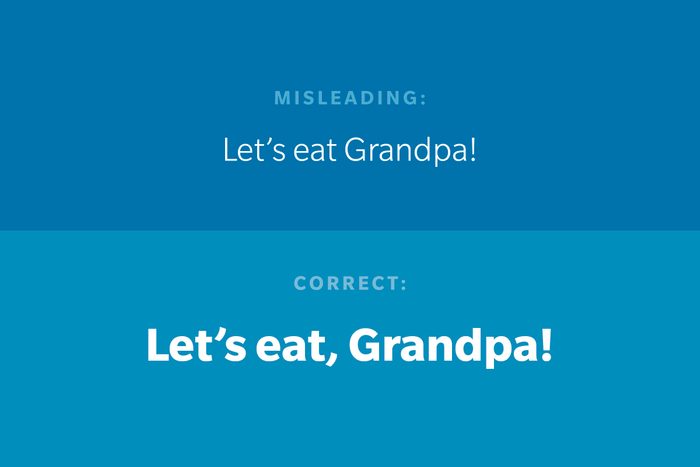Why is punctuation important? Writing without punctuation is like living life without breaks and pauses.

9 Funny Examples That Prove Why Punctuation Is Important


Punctuation keeps people alive
Clarity is essential in life. A misinterpreted sentence, whether verbal or written, may have disastrous consequences. The importance of punctuation marks is clearly demonstrated in the difference between announcing dinner and suggesting cannibalism. “Let’s eat, Grandpa!” and “Let’s eat Grandpa!” are two totally different things. For the sake of Grandpa’s life, use proper punctuation!

Commas bring clarity
This is a big one. Depending upon where you place your comma, a sentence can convey an entirely different meaning than you intend. Look at this sentence: “A woman, without her man, is nothing.” Pretty sexist, right? Now, let’s change where we’re placing the punctuation: “A woman: without her, man is nothing.” Also not flattering, but this time the man is insulted. The importance of punctuation marks goes far beyond rules—it influences meaning at a deeper level.

Missing commas change meaning
If you’re writing a biography on a dating website, the lack of a comma could lead to an immediate left swipe. Take this example: “I love baking, my family and my friends.” Without the comma, the sentence would be “I love baking my family and my friends.” Commas are absolutely necessary to get your point across clearly—without sounding like a cannibal.

The Oxford comma is controversial, but necessary
Some people love it, some people hate it, but the Oxford comma (aka serial comma) does make a difference, though it depends on the context. Let’s say you’re writing your graduation speech, and you’d like to thank your parents, your friend Tiffany and God.
Without the qualifier “your friend,” leaving out the serial comma results in: “I’d like to thank my parents, Tiffany and God.” Are Tiffany and God your parents? Probably not, so the Oxford comma is necessary. As with all punctuation, clarity is the main goal.

Quotation marks aren’t just for dialogue
Quotation marks are often used around direct quotes, and they set off titles of short stories, essays, poems and songs. Another use for these important punctuation marks is to suggest an alternate or ironic meaning for something. (If you use your hands to signal this, they’re called “air quotes.”)
So when you see a sign in a grocery store that says “day-old ‘bread,’” it makes you wonder … is it actually bread? Why is bread in quotation marks? Is it something disguised as bread? We’ll never know because of those confusing quotation marks.

Punctuation saves relationships
Let’s pretend that you and your significant other got into an argument, but you want to sort things out. You send them a text saying, “I’m sorry; I love you,” and all is well in the world. But if you hadn’t placed that semicolon after “sorry,” you would’ve said “I’m sorry I love you.” Are you sorry that you love them? Let’s hope not! Add a semicolon, save a relationship.
Or, imagine texting “Sure.” instead of “Sure!” to your friend. The period feels cold, disinterested or angry, while the exclamation mark makes you sound friendly and enthusiastic. This is another example of how punctuation affects clarity and how these effective communication tools add context to our thoughts, control pacing and emphasize ideas.

Apostrophes can be a little too possessive
Apostrophes are used to indicate possession, or to write a contraction like it’s or don’t (where a letter is purposely omitted). If your last name is Smith, writing “Happy Holidays from the Smith’s” prompts the question “the Smith’s what?” Is the message from the dog? The house? Apostrophe use can get confusing, but just remember that when writing a plural last name, adding an s or es (not an apostrophe!) is the way to go.

Save your excitement for when you’re actually excited
It’s tempting to use exclamation marks, especially if you’re excited (or mad) about something. But sometimes it sends the wrong message. In this sign, is the writer advertising for a job—or trying to find a missing fugitive? Especially in the digital age, when excessive exuberance comes off like screaming, try to get your message across without excess exclamation points. (The same goes for excessive capitalization.)

It can get your hopes up
Here’s where punctuation gets really important: your paycheck. A simple misused comma or period could be the difference between a $1,000 check and a $100,000 check. And let’s be honest, this is the one and only time we’d all like to be victims of a punctuation mistake.
How can you use punctuation effectively?
Want to sharpen your skills? Here are a few tips:
- Read your sentences aloud. Does your writing convey the tone and meaning you want? Are your sentences easy to read, hear and understand? If not, add proper punctuation.
- Know your punctuation marks. Learn the differences between a colon and a semicolon, and understand common punctuation errors like comma splices, misused apostrophes and over-punctuation.
- Practice editing. Review your old writing and see where punctuation could improve flow or meaning.
FAQ
Can emojis be used to convey meaning instead of punctuation marks?
Yes, but just like with punctuation, it’s important not to use emojis excessively—especially in a formal or business setting. A little goes a long way.
Why trust us
At Reader’s Digest, we’re committed to producing high-quality content by writers with expertise and experience in their field in consultation with relevant, qualified experts. We rely on reputable primary sources, including government and professional organizations and academic institutions as well as our writers’ personal experiences where appropriate. We verify all facts and data, back them with credible sourcing and revisit them over time to ensure they remain accurate and up to date. Read more about our team, our contributors and our editorial policies.
Sources
- Northern Illinois University: “Effective Writing Practices Tutorial”
- The Creative Penn: “How Writers Use Punctuation To Great Effect”
- Om Proofreading: “6 Reasons Why Punctuation Is Important (with Examples)”


















